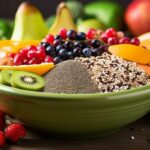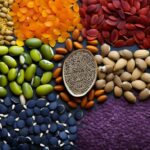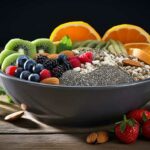Beginners Guides
Chia Seed Shortage

Are you passionate about chia seeds? Get ready, because we’re about to drop some astonishing news.
The chia seed shortage is hitting us hard, and it’s causing quite a stir in the health food industry. But fear not, fellow health-conscious individuals, as we delve into the reasons behind this scarcity and explore alternative options.
Join us as we analyze the impact, challenges, and future outlook of the chia seed availability, serving you the data-driven insights you need.
Key Takeaways
- High demand for chia seeds combined with limited supply
- Disrupted supply chain leading to higher prices and limited availability
- Need for sustainable farming practices to meet demand
- Flaxseeds, hemp seeds, and pumpkin seeds as popular alternatives
Reasons Behind the Shortage
One of the main reasons behind the chia seed shortage is due to a high demand for the product combined with a limited supply. The increasing popularity of chia seeds as a health food has led to a surge in consumer demand. However, the production of chia seeds is faced with several challenges.

Firstly, the cultivation of chia seeds is a time-consuming process, as the plant requires specific conditions to grow. Additionally, the weather patterns in some regions where chia seeds are grown can be unpredictable, affecting the yield. Moreover, the limited availability of suitable land for cultivation further contributes to the scarcity of chia seeds.
As a result, enthusiasts of chia seeds may need to consider alternative options such as flaxseeds or hemp seeds, which offer similar nutritional benefits. Looking ahead, it’s crucial for the industry to explore ways to increase production and ensure a steady supply of chia seeds in the future.
Impact on Health Food Industry
The chia seed shortage has had a significant impact on the health food industry, as suppliers struggle to meet the growing demand for this popular superfood.
The market demand for chia seeds has been steadily increasing over the past few years, fueled by the rising interest in healthy eating and plant-based diets.
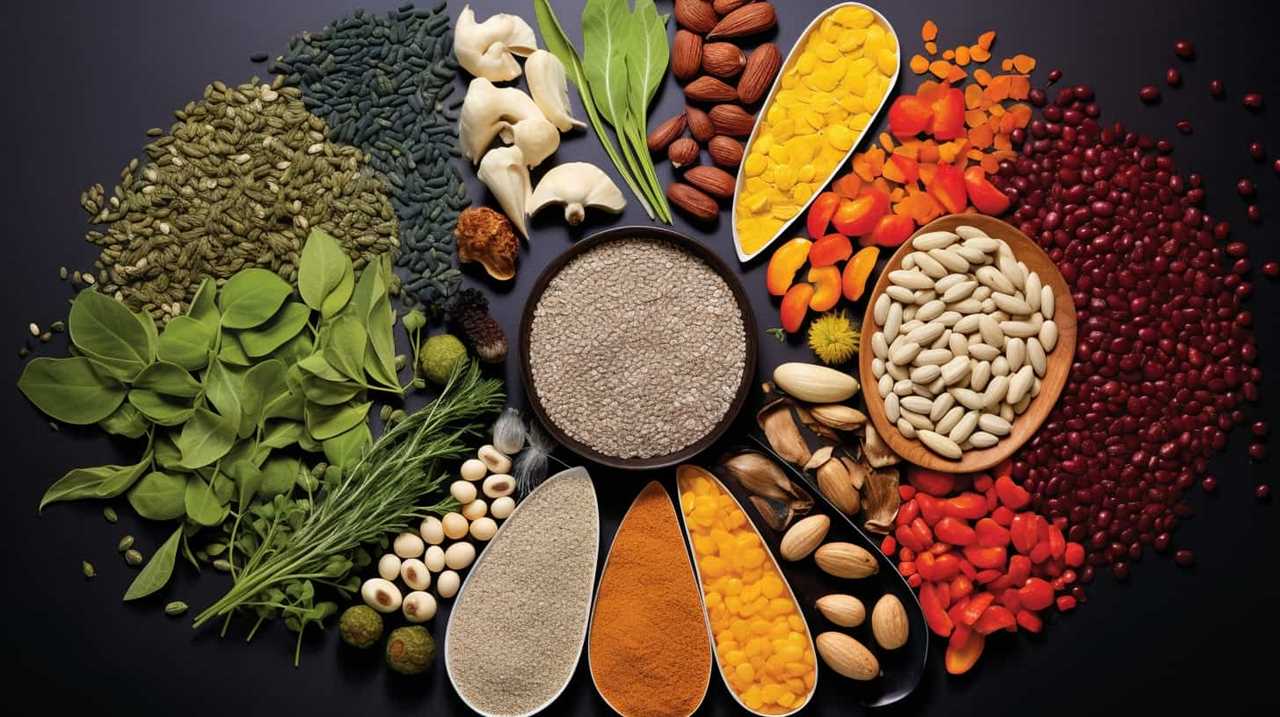
However, the shortage has disrupted the supply chain, leading to higher prices and limited availability of chia seeds in stores.
This hasn’t only affected consumers who rely on chia seeds as a nutritious addition to their diet, but also health food businesses that rely on chia seeds as a key ingredient in their products.
The economic implications of this shortage are far-reaching, as companies face challenges in sourcing chia seeds and may need to explore alternative ingredients or pass on the increased costs to consumers.
Challenges in Chia Seed Production
As we delve into the challenges in chia seed production, we encounter the need to address the growing demand for this superfood and its impact on the health food industry. Chia seed farming techniques play a crucial role in meeting this demand. Farmers must employ sustainable practices to ensure a consistent and high-quality supply of chia seeds. This includes optimizing soil conditions, managing water resources efficiently, and implementing effective pest and weed control strategies.
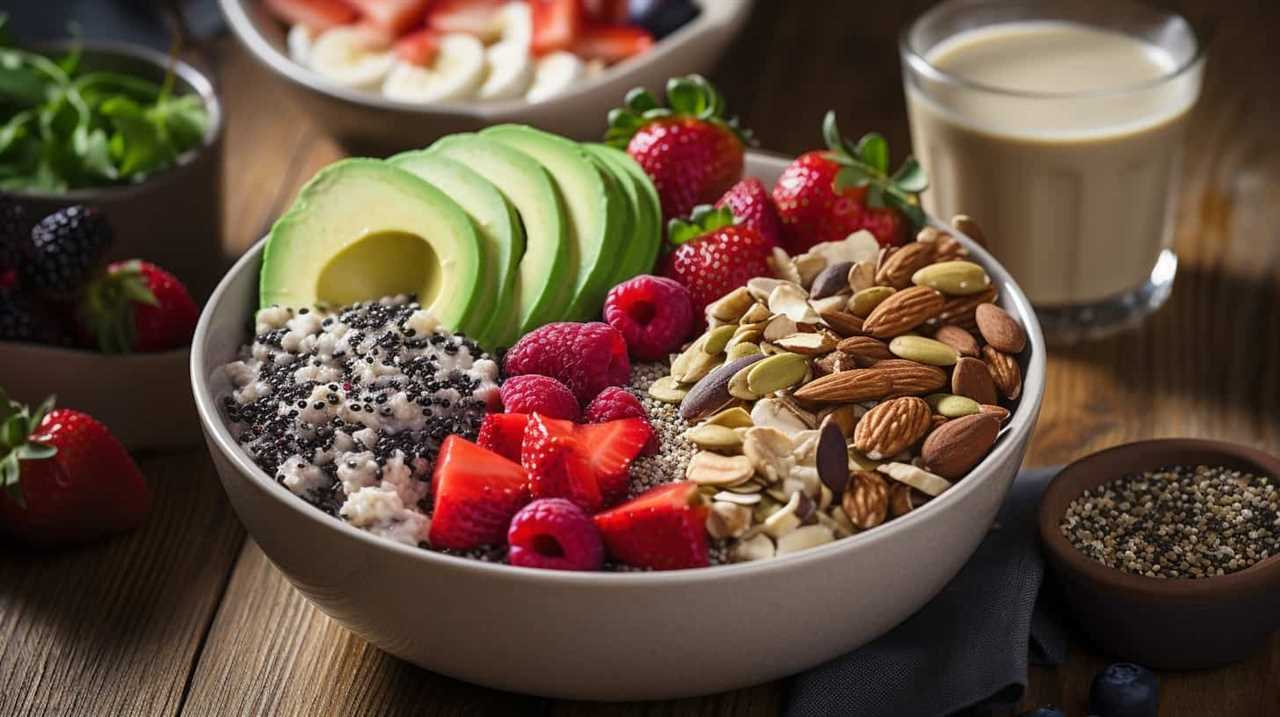
Additionally, chia seed market competition poses a challenge for producers. With the increasing popularity of chia seeds, more companies are entering the market, leading to higher competition and the need for differentiation. Producers must focus on branding, product quality, and innovation to stay ahead in this competitive landscape.
Alternatives for Chia Seed Enthusiasts
For chia seed enthusiasts facing the current shortage, we can explore alternative options to incorporate into our diets. Here are three alternatives to consider:
-
Flaxseed: Flaxseeds are a great substitute for chia seeds, offering similar health benefits. They’re packed with omega-3 fatty acids, fiber, and antioxidants. Incorporate flaxseeds into your diet by adding them to smoothies, oatmeal, or baked goods. They can also be used as an egg replacement in vegan recipes.
-
Quinoa: Quinoa is a versatile grain that can be used in various dishes. It’s a good source of protein, fiber, and essential nutrients. Use quinoa as a base for salads, stir-fries, or as a substitute for rice. There are plenty of quinoa recipes available that can help you explore different flavors and textures.
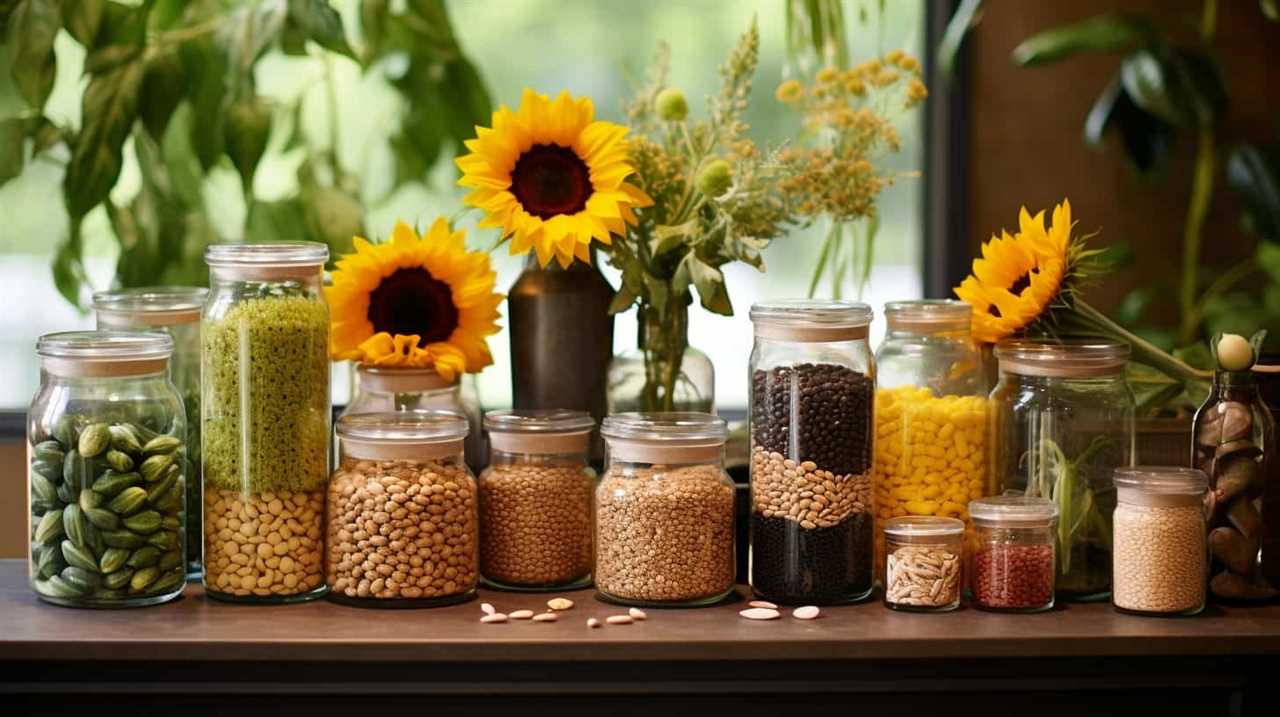
-
Hemp seeds: Hemp seeds are another nutritious alternative to chia seeds. They’re rich in protein, healthy fats, and minerals. Sprinkle hemp seeds on top of yogurt, salads, or blend them into your smoothies. They add a nutty flavor and a crunchy texture to your meals.
Future Outlook for Chia Seed Availability
Moving forward, we’ll continue to monitor the availability of chia seeds with regular updates. As the demand for chia seeds continues to rise, it’s important to explore potential substitutes for chia seeds and understand the market trends associated with this versatile seed.
Chia seed substitutes offer a viable option for consumers who are unable to find chia seeds. Flaxseeds, hemp seeds, and pumpkin seeds are popular alternatives that provide similar nutritional benefits. These substitutes can be easily incorporated into various recipes, such as smoothies, baked goods, and salads.
In terms of market trends, the shortage of chia seeds has led to an increase in prices. This has prompted some consumers to seek out alternatives or reduce their consumption. Additionally, the chia seed market has witnessed a surge in research and development activities to find sustainable solutions for increasing supply and meeting the growing demand.
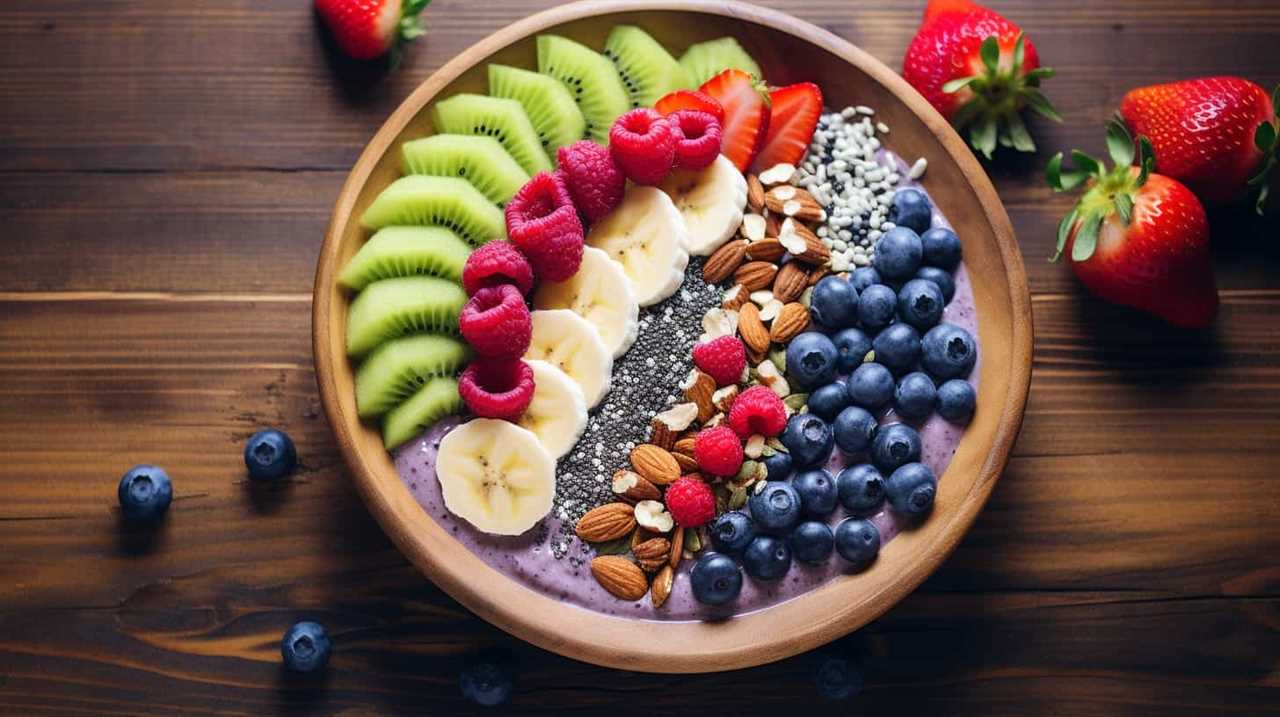
Frequently Asked Questions
How Long Is the Chia Seed Shortage Expected to Last?
The expected duration of the chia seed shortage is uncertain, but it is impacting various industries. The shortage’s impact can range from disruptions in supply chains to higher prices for consumers, affecting businesses and individuals alike.
Are There Any Specific Regions or Countries That Are More Affected by the Chia Seed Shortage?
When considering the potential regions affected by the chia seed shortage and its impact on the global food supply, it is crucial to analyze the data and industry trends.
What Are the Potential Consequences of the Chia Seed Shortage on the Environment?
Potential environmental consequences of the chia seed shortage could include a negative impact on biodiversity. This shortage may disrupt the ecosystem dynamics and affect the various species that depend on chia seeds as a food source.
Are There Any Government Initiatives or Programs in Place to Address the Chia Seed Shortage?
In analyzing the government’s response to the chia seed shortage, we find a lack of comprehensive initiatives to address the issue. The chia seed supply chain remains vulnerable, necessitating urgent action to ensure a stable and sustainable future.
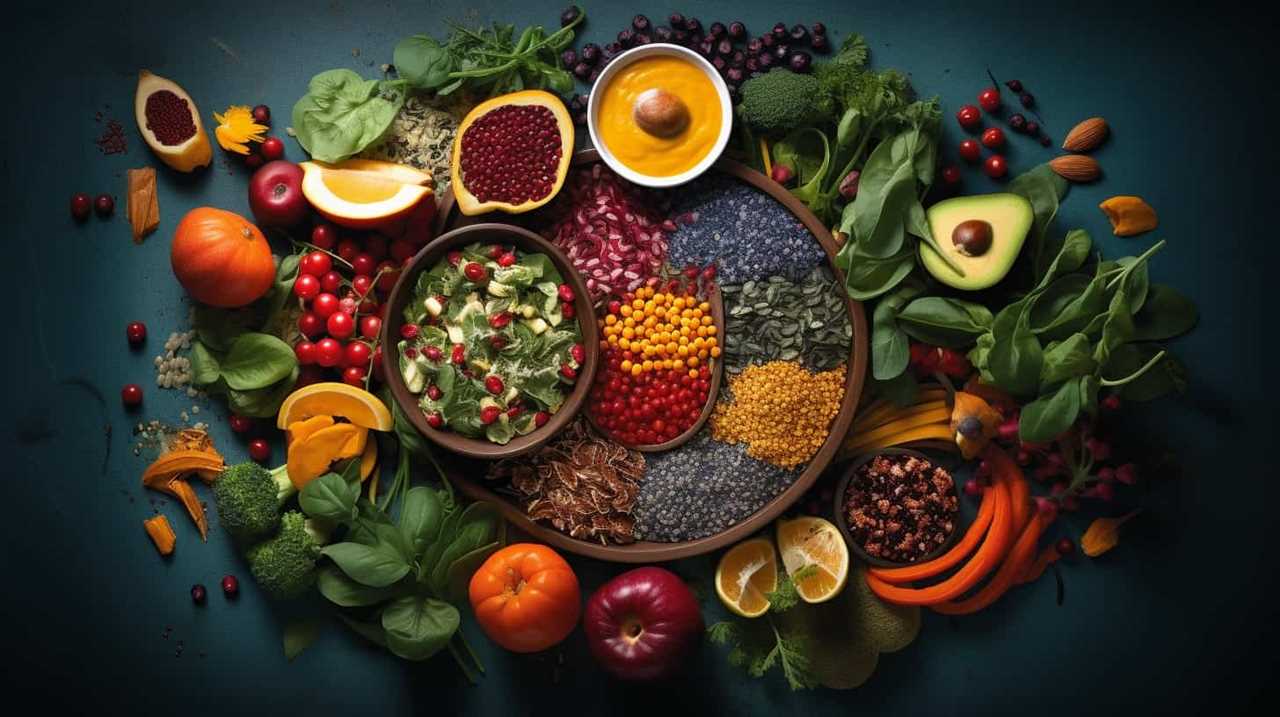
Are There Any Potential Health Risks Associated With Consuming Alternative Seeds in Place of Chia Seeds?
Potential health risks associated with consuming alternative seeds in place of chia seeds include possible allergic reactions, lower nutritional value, and lack of specific health benefits. Nutritional alternatives should be chosen carefully to ensure optimal health benefits.
Conclusion
In conclusion, the chia seed shortage has sent shockwaves through the health food industry, leaving enthusiasts scrambling for alternatives. The challenges in chia seed production have caused a ripple effect, impacting availability and causing prices to skyrocket.
With the current outlook, it seems that chia seed availability may become a thing of the past. This data-driven analysis paints a bleak future for chia seed enthusiasts, forcing them to explore other options to meet their nutritional needs.
Hi, I’m Sarah. I write for Turtle Tree Seeds, a news blog that loves food – all kinds of food. But especially bacon, chocolate, and veggies. We’re on a mission to show the world that you can enjoy all of those things, even kale and brussels sprouts. Because we believe that when it comes to food, there’s no such thing as guilty pleasures. Just pleasures.
I’m also a huge fan of puns (obviously).
Beginners Guides
Chia Seed Toilet Seat


Are you tired of uncomfortable and unsanitary toilet seats? Do not worry, we have the ideal solution for you! Introducing the innovative chia seed toilet seat.
Yes, you heard it right, chia seeds in your bathroom! This innovative product not only enhances your comfort and hygiene, but also promotes sustainability with its eco-friendly flush.
Join us as we explore the incredible benefits of incorporating chia seeds into your bathroom routine and take your bathroom experience to the next level.
Key Takeaways
- Chia seeds are incorporated into the material of the toilet seat, providing a unique texture.
- The gel-like transformation of chia seeds when they come into contact with moisture adds a soft and cushiony feel to the seat.
- The chia seed gel properties help reduce friction and minimize skin irritation, enhancing comfort and hygiene.
- The use of chia seeds in toilet seats contributes to a more sustainable and eco-friendly bathroom experience.
The Benefits of Chia Seeds in Your Bathroom
In our bathroom, we can reap the benefits of chia seeds. Not only are they delicious and nutritious when included in our diet, but chia seeds also offer unique advantages when incorporated into our bathroom decor and DIY projects.

Chia seed decor is becoming increasingly popular, as these tiny seeds can be used to create beautiful and natural-looking pieces. From chia seed wall art to chia seed flower pots, the possibilities are endless.
Additionally, chia seeds can be used in DIY projects to add texture and interest to various bathroom items. For example, mixing chia seeds with paint can create a unique textured effect on bathroom walls or cabinets.
By using chia seeds in our bathroom decor and DIY projects, we can create a space that’s both aesthetically pleasing and beneficial to our well-being.
Now, let’s explore how the chia seed toilet seat works.

How the Chia Seed Toilet Seat Works
The chia seed toilet seat works by incorporating chia seeds into the material of the seat, providing a unique and natural texture. Chia seeds are known for their germination properties, which means they can sprout and grow in the right conditions. This feature is utilized in the toilet seat to create a comfortable and eco-friendly experience.
When the chia seeds come into contact with moisture, they undergo a gel-like transformation due to their high water-absorption capacity. This gel-like substance adds a soft and cushiony feel to the seat, enhancing user comfort. Additionally, the chia seed gel properties help to reduce friction and minimize the risk of skin irritation.
Enhancing Comfort and Hygiene With Chia Seeds
Continuing our exploration of the chia seed toilet seat, let’s delve into how these remarkable seeds enhance comfort and hygiene.
Chia seeds, known for their absorbent properties, can be used to create chia seed toilet paper, providing a gentle and soothing experience for the user. The seeds’ natural gel-like texture helps to moisturize the skin while effectively cleaning.

In addition to chia seed toilet paper, these versatile seeds can also be used to make chia seed bath mats. These mats, when wet, release a gel-like substance that creates a soft and cushioned surface, enhancing the comfort of your bath or shower experience. The chia gel also helps to keep the mat clean and hygienic, preventing the growth of bacteria and mold.
Eco-Friendly Flush: Chia Seeds and Sustainability
For an eco-friendly flush, we can incorporate chia seeds into our bathroom routine.
Chia seeds, known for their numerous health benefits, can also contribute to sustainability. Cultivating chia seeds requires minimal water and pesticides, making it an environmentally friendly crop. By incorporating chia seeds into our diet, we’re supporting sustainable farming practices.
But chia seeds can go beyond just being a nutritious addition to our meals. When flushed down the toilet, chia seeds can help clean the pipes and promote better water flow, reducing the need for harsh chemicals or frequent plumbing maintenance.

By embracing chia seeds as a holistic solution, we can take our bathroom experience to the next level and contribute to a more sustainable and eco-friendly lifestyle.
Now, let’s dive into the various ways chia seeds can transform our bathroom routine.
Taking Your Bathroom Experience to the Next Level With Chia Seeds
Let’s enhance our bathroom experience by incorporating chia seeds into our daily routine. Chia seeds offer more than just health benefits; they can also elevate the ambiance and functionality of your bathroom. Here are five ways you can take your bathroom to the next level with chia seeds:
-
Chia seed bathroom decor: Sprinkle chia seeds on top of potpourri or use them as a natural and sustainable alternative to synthetic air fresheners.

-
Chia seed bathroom accessories: Create unique soap dispensers by filling clear bottles with chia seeds. The seeds will add texture and visual interest to your bathroom countertop.
-
Chia seed bath mat: Mix chia seeds with water and let them sit until they form a gel-like substance. Spread this mixture onto a non-slip surface and let it dry. You’ll have a comfortable and eco-friendly bath mat that can be easily cleaned.
-
Chia seed shower curtain: Sew chia seeds into the hem of a clear shower curtain to create a subtle and elegant design element in your bathroom.
-
Chia seed wall art: Use chia seeds to create intricate patterns or designs on a canvas or wooden frame. Hang this unique artwork in your bathroom for a touch of natural beauty.

Frequently Asked Questions
Are Chia Seeds Safe to Use on a Toilet Seat?
Chia seeds can be a unique and natural option for covering a toilet seat. They offer a textured surface and are safe to use. However, it’s important to clean and maintain the seat regularly to prevent any potential bacterial growth.
Can Chia Seeds Be Used on Any Type of Toilet Seat?
Chia seeds can be used in various ways to promote overall health. They are known for their numerous benefits, such as providing omega-3 fatty acids and fiber. Additionally, chia seeds can be creatively incorporated into cooking and baking recipes.
How Long Do Chia Seeds Last on a Toilet Seat Before They Need to Be Replaced?
On a toilet seat, chia seeds typically last for about 1-2 weeks before they need to be replaced. Incorporating chia seed benefits into recipes is a great way to enjoy their nutritional value.
Can Chia Seeds Be Used on Other Bathroom Surfaces, Such as Countertops or Shower Walls?
Using chia seeds as a natural exfoliant for the skin can have potential benefits and drawbacks. While they may be effective on countertops or shower walls, it’s important to consider hygiene and cleanliness.

Are There Any Potential Health Risks Associated With Using Chia Seeds on a Toilet Seat?
There can be potential health risks and safety concerns associated with using chia seeds on a toilet seat. It is important to consider these factors before incorporating chia seeds into your bathroom routine.
Conclusion
In conclusion, the chia seed toilet seat is the epitome of innovation and absurdity. While it claims to enhance comfort and hygiene, one can’t help but question the necessity of incorporating chia seeds into our bathroom experience.
Perhaps it’s time to focus on more practical and sustainable solutions that truly benefit both our bodies and the environment. Let’s leave the chia seeds for our smoothies and salads, and keep our toilet seats simple and functional.
Hi, I’m Sarah. I write for Turtle Tree Seeds, a news blog that loves food – all kinds of food. But especially bacon, chocolate, and veggies. We’re on a mission to show the world that you can enjoy all of those things, even kale and brussels sprouts. Because we believe that when it comes to food, there’s no such thing as guilty pleasures. Just pleasures.
I’m also a huge fan of puns (obviously).
Beginners Guides
Ch Ch Ch Chia

You must have heard the fun jingle and seen those ads, but did you realize that **chia seeds** go beyond being just a novelty? Discover the amazing benefits they offer and why you should definitely keep reading to find out more.
Chia seeds are a nutritional powerhouse, packed with essential nutrients and health benefits.
In this article, we’ll explore the origins of chia seeds, the numerous health benefits they offer, and how you can incorporate them into your daily routine.
Get ready to join the growing trend in wellness with ch ch ch chia!
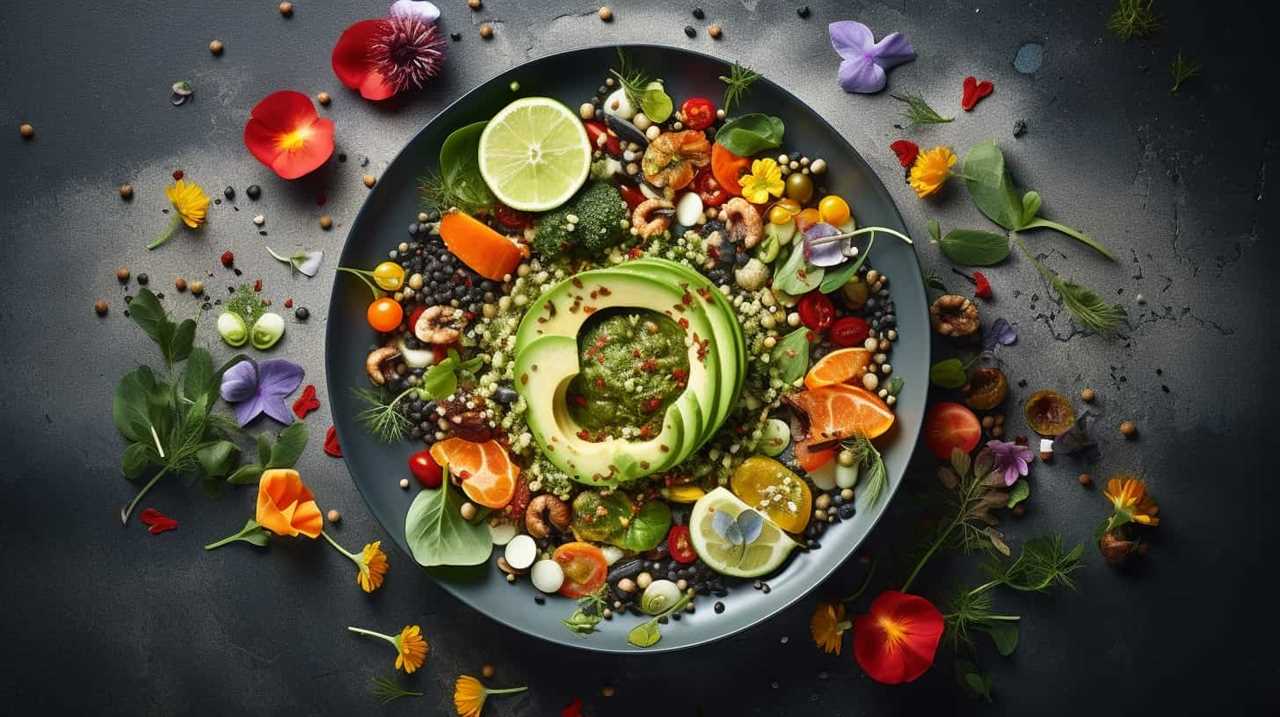
Key Takeaways
- Chia seeds originated from ancient civilizations of Mesoamerica and were a staple food for the Aztecs and Mayans.
- Chia seeds are packed with essential nutrients including fiber, protein, and omega-3 fatty acids.
- Chia seeds have versatile culinary uses and can be added to smoothies, used as an egg substitute in baking, and incorporated into various dishes for their health benefits.
- Chia seeds have become a growing trend in wellness due to their nutritional value and various health benefits.
The Origins of Chia Seeds
Chia seeds have a rich history, originating from the ancient civilizations of Mesoamerica. These tiny seeds hold not only nutritional value but also cultural significance. They were a staple food for the Aztecs and Mayans, known for their ability to provide sustainable energy.
Chia seeds were highly valued for their medicinal properties, believed to improve endurance and promote overall well-being. The cultural significance of chia seeds extended beyond their practical uses, as they were also incorporated into religious ceremonies.
Today, chia seeds continue to be celebrated for their health benefits and versatility in the culinary world. Exploring different varieties of chia seeds allows us to appreciate their diverse characteristics, such as color, texture, and nutritional composition. Whether it’s white, black, or golden chia seeds, each variety offers unique qualities that can enhance our meals and support our well-being.
Health Benefits of Ch Ch Ch Chia
Continuing from our exploration of the origins and cultural significance of chia seeds, it’s important to highlight the numerous health benefits they offer.
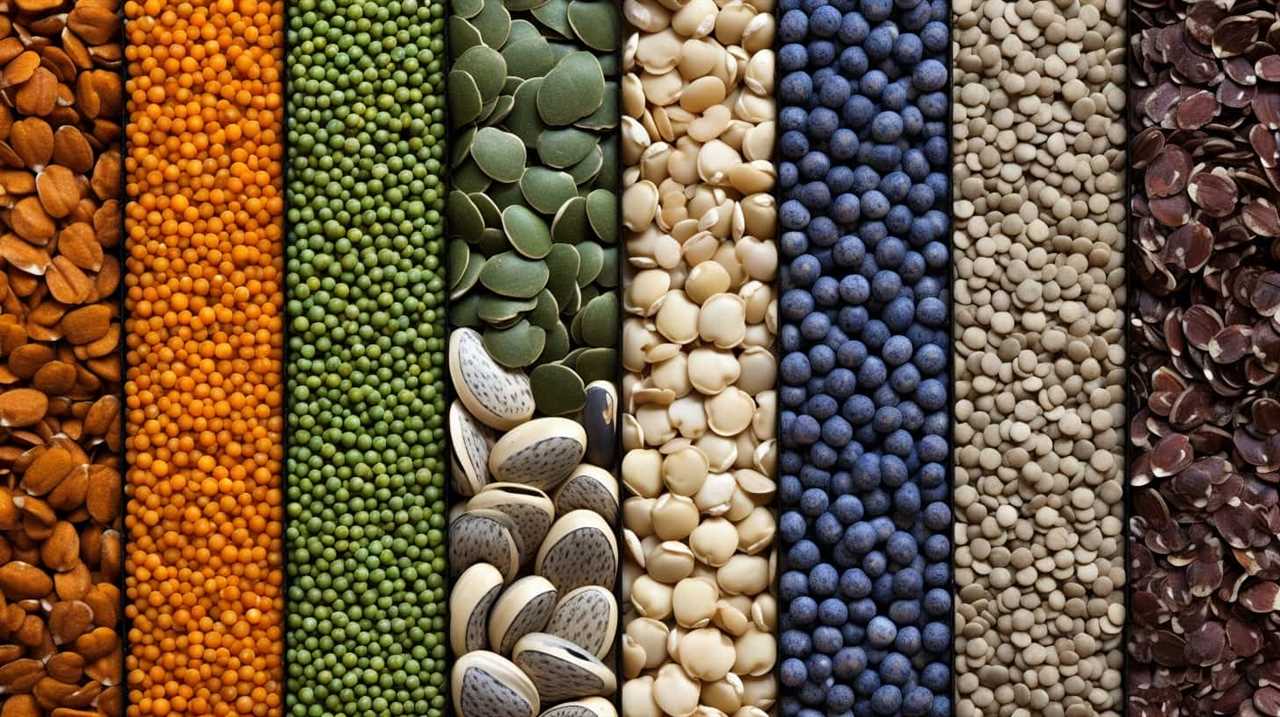
Chia seeds are packed with nutritional value, making them a valuable addition to a healthy diet. These tiny seeds are rich in fiber, protein, omega-3 fatty acids, and various micronutrients such as calcium, magnesium, and phosphorus.
Consuming chia seeds can help promote digestion, regulate blood sugar levels, and support heart health. Furthermore, chia seeds can be incorporated into a wide range of chia seed recipes, allowing for versatile culinary uses. From adding them to smoothies and yogurt to using them as an egg substitute in baking, there are countless ways to enjoy the health benefits of chia seeds.
Transitioning into the next section, let’s now delve into the culinary uses for ch ch ch chia.
Culinary Uses for Ch Ch Ch Chia
To explore the culinary uses for chia seeds, let’s now delve into how we can incorporate them into various dishes.

Cooking with chia opens up a world of possibilities, as these tiny seeds are incredibly versatile. One popular way to use chia seeds is by adding them to smoothies or yogurt for a nutritious boost. They can also be used as an egg substitute in baking, making them a great option for those with dietary restrictions.
Chia seed recipes range from puddings and energy bars to salads and even bread. Their mild, nutty flavor complements both sweet and savory dishes. By incorporating chia into our cooking, we can elevate the nutritional value of our meals while adding a delightful crunch.
Now, let’s explore how we can easily incorporate chia into our daily routine.
Incorporating Chia Into Your Daily Routine
Let’s explore how we can easily add chia seeds to our daily routine.

Chia seeds are a versatile ingredient that can be incorporated into various dishes, providing us with a multitude of health benefits.
One way to enjoy chia seeds is by including them in our smoothies. Chia seed smoothie recipes are abundant, offering a delicious and nutritious way to start our day.
We can also experiment with chia seed pudding variations, turning this humble seed into a delightful dessert or snack.
By adding chia seeds to our daily routine, we can boost our intake of essential nutrients, such as fiber, omega-3 fatty acids, and antioxidants.
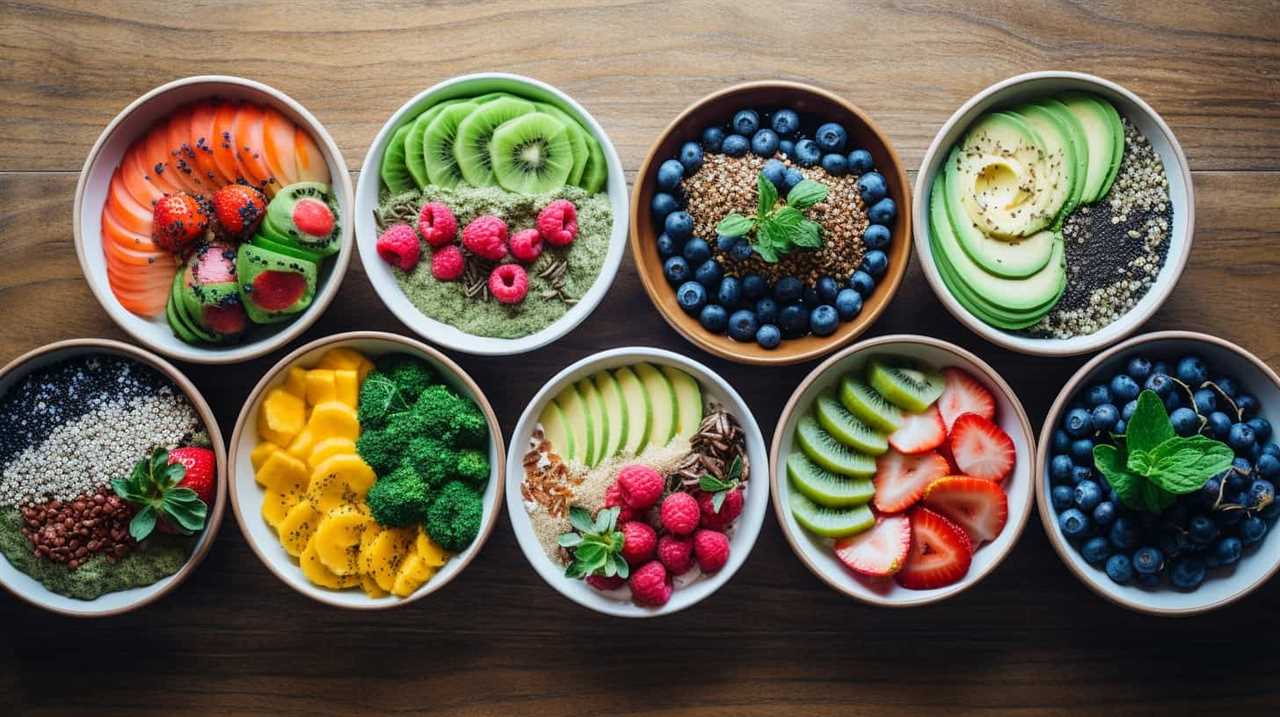
Ch Ch Ch Chia: A Growing Trend in Wellness
As we delve deeper into the world of chia seeds, it becomes evident that their rising popularity isn’t just a passing trend, but rather a manifestation of the growing wellness movement. Chia seeds have become a staple ingredient in many chia recipes, especially in the form of chia pudding. This versatile and nutritious dish is easy to make and offers a variety of health benefits.
Chia pudding is packed with fiber, promoting digestive health and helping to regulate blood sugar levels. It’s a great source of omega-3 fatty acids, which are essential for brain health and reducing inflammation. Chia pudding is also rich in antioxidants, which can protect against chronic diseases and support a strong immune system.
Frequently Asked Questions
Are Chia Seeds a Good Source of Protein?
Chia seeds are a good source of protein, with 2 tablespoons containing about 4 grams. They also offer other nutrients like fiber and omega-3 fatty acids. To incorporate them into your diet, try adding them to smoothies or yogurt.
Can Chia Seeds Help With Weight Loss?
Chia seeds can aid in weight loss by promoting satiety and supporting digestion. Incorporating chia seeds into a balanced diet may help us achieve our weight loss goals.
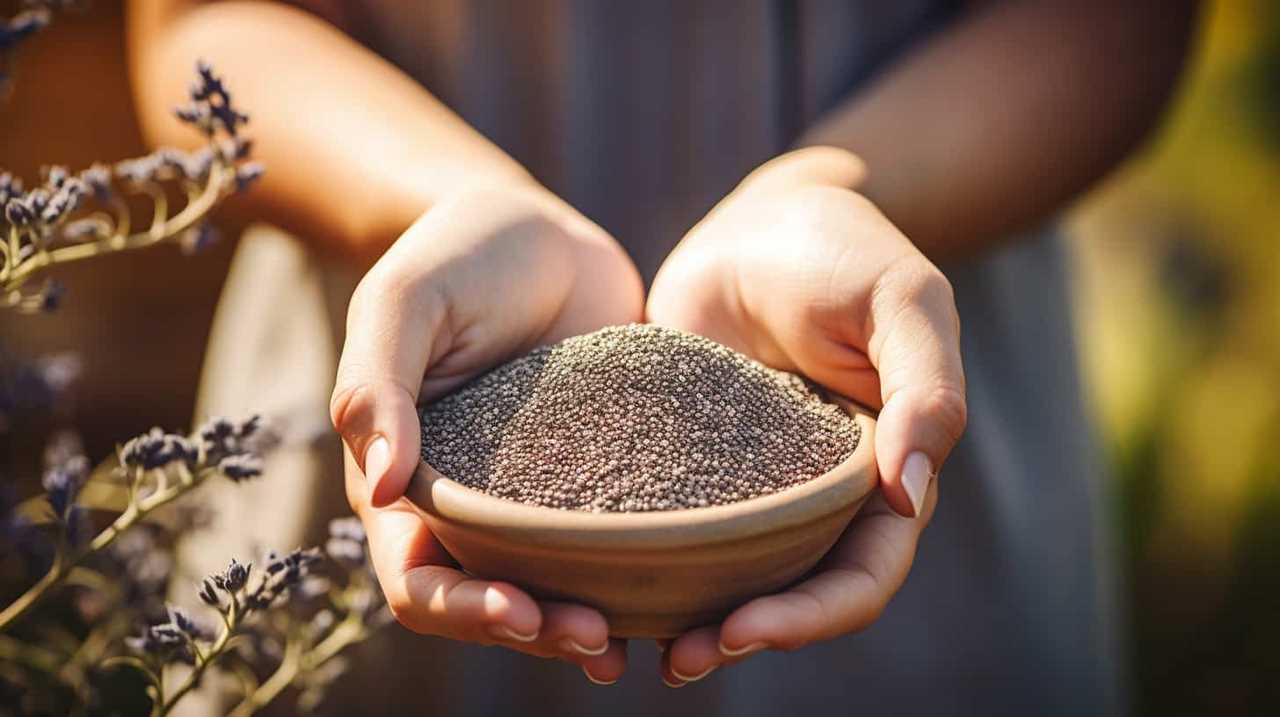
How Long Do Chia Seeds Stay Fresh?
Chia seeds can stay fresh for up to two years if stored properly. Proper long term storage involves keeping them in an airtight container in a cool, dry place. Additionally, consuming chia seeds provides various health benefits.
Can Chia Seeds Be Used as an Egg Substitute in Baking?
Chia seeds are a versatile vegan alternative in baking. To use them as an egg replacement in recipes, simply mix one tablespoon of chia seeds with three tablespoons of water and let it sit for 15 minutes until it forms a gel-like consistency.
What Are Some Common Side Effects of Consuming Chia Seeds?
Consuming chia seeds can have common side effects, such as bloating and gas. However, they are also known for boosting energy and improving digestion. Chia seeds are a versatile and nutritious addition to one’s diet.
Conclusion
In conclusion, chia seeds have gained popularity in the wellness industry due to their numerous health benefits and versatile culinary uses.
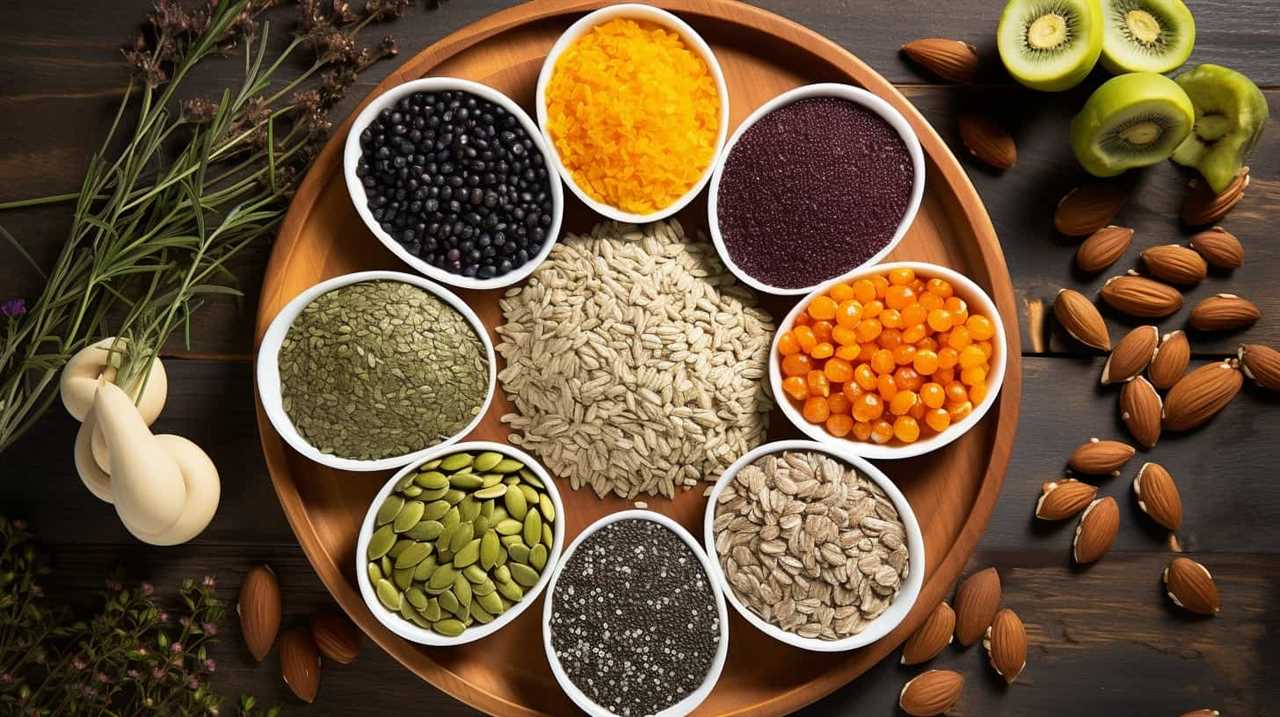
Incorporating chia seeds into your daily routine can contribute to improved heart health, increased energy levels, and enhanced digestion.
Interestingly, studies have shown that chia seeds can absorb up to 10 times their weight in water, making them a great source of hydration.
Join the growing trend of including chia seeds in your diet and experience the positive impact on your overall well-being.
Hi, I’m Sarah. I write for Turtle Tree Seeds, a news blog that loves food – all kinds of food. But especially bacon, chocolate, and veggies. We’re on a mission to show the world that you can enjoy all of those things, even kale and brussels sprouts. Because we believe that when it comes to food, there’s no such thing as guilty pleasures. Just pleasures.
I’m also a huge fan of puns (obviously).
Beginners Guides
Is Chia Seeds Good for Kidney
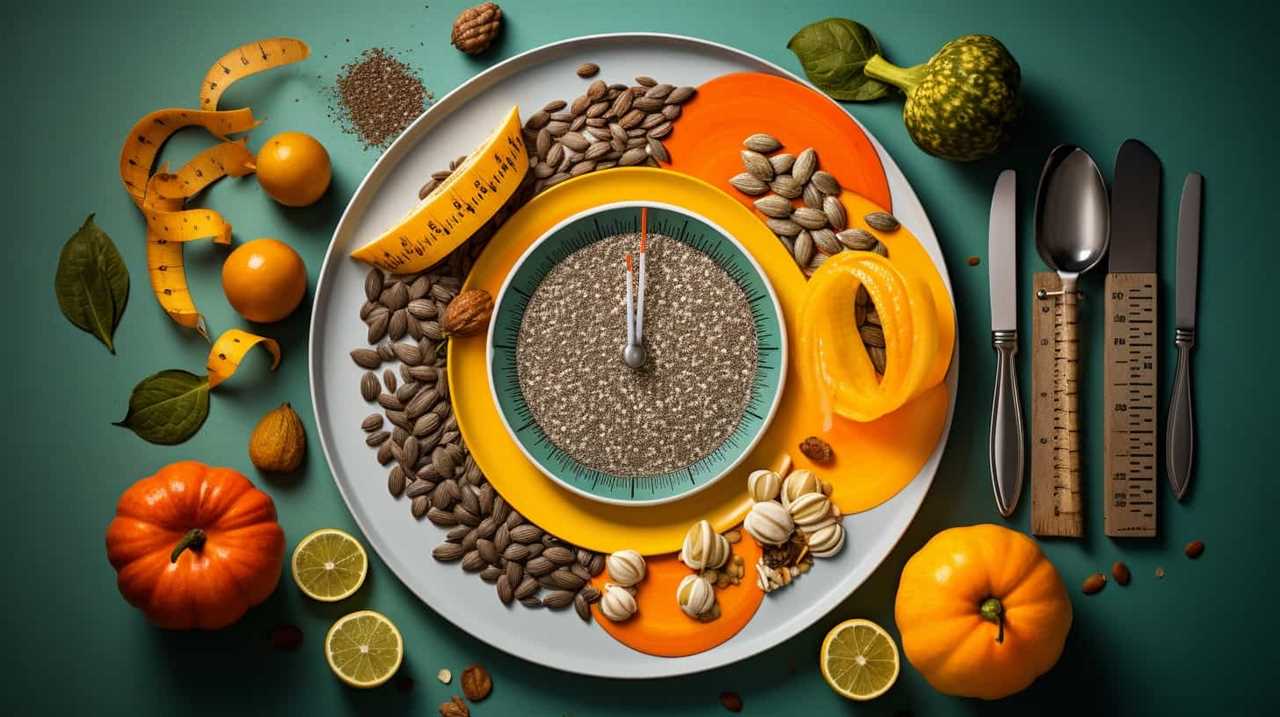
Is it beneficial to include chia seeds in our diet to support kidney health? We’ll delve into the advantages, supported by scientific studies and the views of experts regarding the effectiveness and safety of chia seeds for maintaining kidney health.
We’ll delve into their nutritional profile, examining how it impacts our kidneys. It’s crucial to consider precautions for individuals with kidney problems when consuming chia seeds.
Join us on this evidence-based journey to determine if chia seeds are good for our kidneys.
Key Takeaways
- Chia seeds support hydration and prevent dehydration due to their high water-absorbing properties and soluble fiber content.
- Chia seeds contain essential minerals like potassium and magnesium, which regulate blood pressure and electrolyte balance, contributing to kidney health.
- Chia seeds have been shown to improve kidney function in individuals with chronic kidney disease by reducing oxidative stress and inflammation.
- Personalized advice and consultation with healthcare professionals are important for individuals with kidney disease considering the incorporation of chia seeds into their diet.
Potential Benefits of Chia Seeds for Kidney Health
One potential benefit of chia seeds for kidney health is their ability to support hydration due to their high water-absorbing properties. Chia seeds are rich in soluble fiber, which forms a gel-like substance when combined with water. This gel can help retain water in the body, preventing dehydration and promoting optimal kidney function.
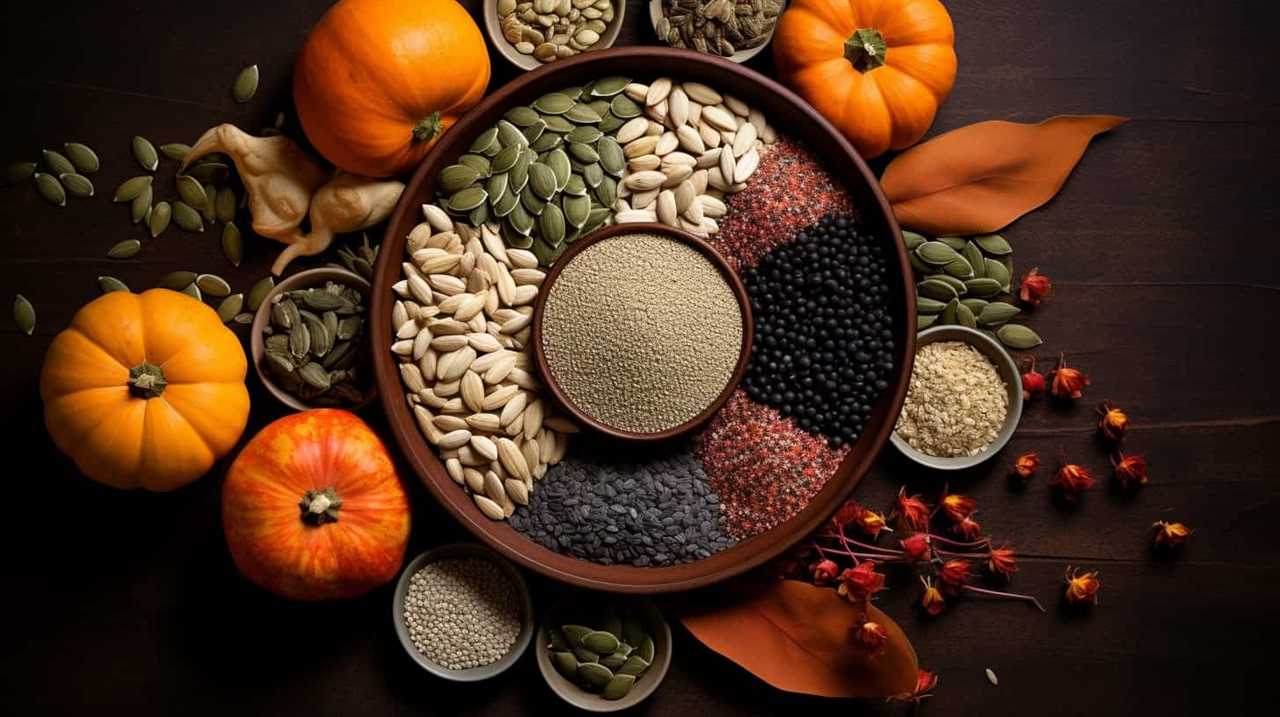
Additionally, chia seeds contain essential minerals such as potassium and magnesium, which are crucial for maintaining renal function. These minerals help regulate blood pressure and electrolyte balance, reducing the risk of kidney disease.
However, it’s important to note that chia seeds should be consumed in moderation, as excessive intake may lead to gastrointestinal discomfort. As always, it’s advisable to consult with a healthcare professional before making any dietary changes, especially for individuals with pre-existing kidney conditions.
Nutritional Profile of Chia Seeds and Its Impact on Kidneys
Continuing the discussion from the previous subtopic, the nutritional profile of chia seeds plays a significant role in their impact on kidney health. Chia seeds are packed with essential nutrients that can support kidney function. They’re an excellent source of fiber, omega-3 fatty acids, protein, and antioxidants.
The high fiber content helps regulate blood sugar levels and promote healthy digestion, which is beneficial for individuals with kidney disease. Omega-3 fatty acids have anti-inflammatory properties that may reduce the risk of kidney damage and improve kidney function. Additionally, chia seeds are a good source of plant-based protein, which can help meet the protein needs of individuals with kidney disease.

The antioxidants in chia seeds also contribute to kidney health by protecting against oxidative stress. However, it’s important to consume chia seeds in moderation and consult with a healthcare professional before making any significant dietary changes.
Transitioning into the subsequent section about scientific research on chia seeds and kidney function, let’s explore the latest studies that shed light on the relationship between chia seeds and kidney health.
Scientific Research on Chia Seeds and Kidney Function
Research has shown that chia seeds have positive effects on kidney function. Several studies have investigated the relationship between chia seeds and kidney disease, as well as chia seeds and renal function.
One study published in the Journal of Renal Nutrition found that consuming chia seeds improved kidney function in individuals with chronic kidney disease. Another study published in the Journal of Food Science and Technology showed that chia seeds had a protective effect on renal function by reducing oxidative stress and inflammation.
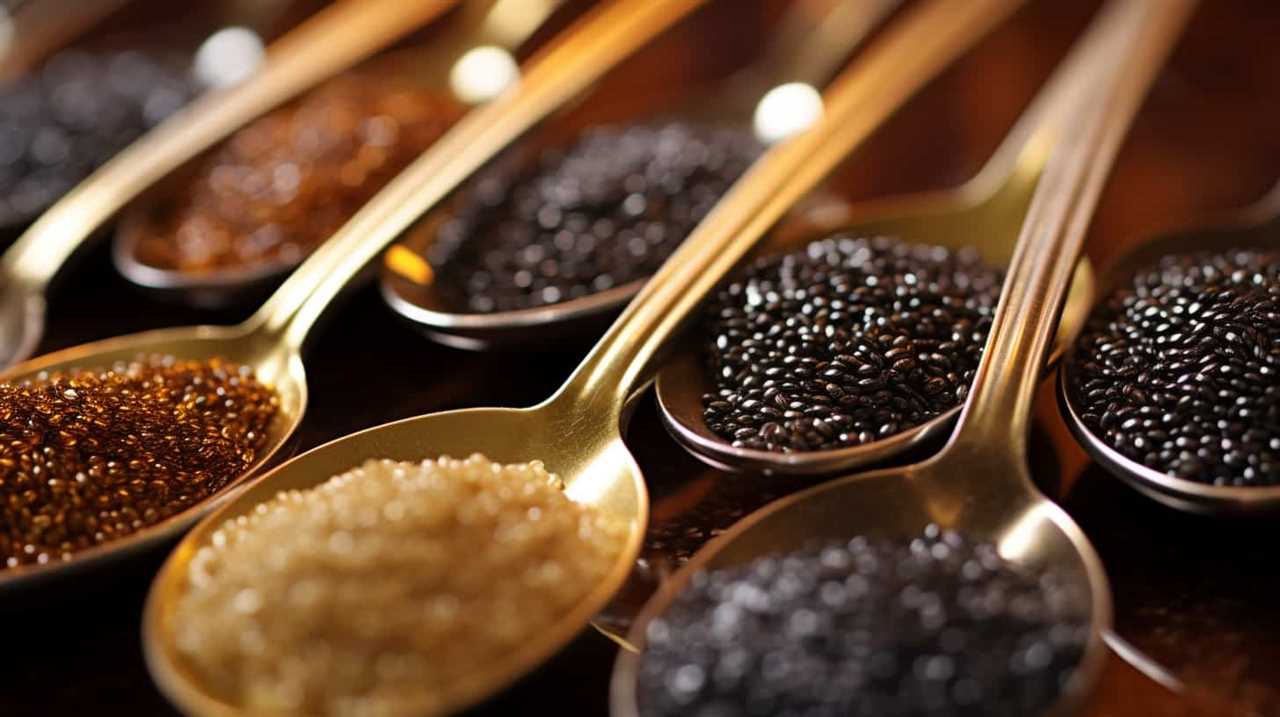
These findings suggest that incorporating chia seeds into a balanced diet may be beneficial for individuals with kidney problems. However, it’s important to note that more research is needed to fully understand the impact of chia seeds on kidney health.
In the next section, we’ll discuss precautions for individuals with kidney problems when consuming chia seeds.
Precautions for Individuals With Kidney Problems When Consuming Chia Seeds
To ensure the safety and well-being of individuals with kidney problems, it’s important for us to consider some precautions when incorporating chia seeds into our diet. While chia seeds are generally considered safe for consumption, those with kidney disease should exercise caution.
Here are three key precautions to keep in mind:

-
Consult with your healthcare provider: If you have kidney disease, it’s crucial to consult with your healthcare provider before adding chia seeds to your diet. They can provide personalized advice based on your specific condition and medical history.
-
Moderation is key: It’s important to consume chia seeds in moderation if you have kidney problems. Excessive consumption may put additional strain on the kidneys, which can be harmful.
-
Watch out for chia seed allergies: Although rare, some individuals may be allergic to chia seeds. If you have a known allergy to seeds or nuts, it’s recommended to avoid chia seeds to prevent any adverse reactions.
Considering these precautions will help individuals with kidney problems make informed decisions about incorporating chia seeds into their diet.
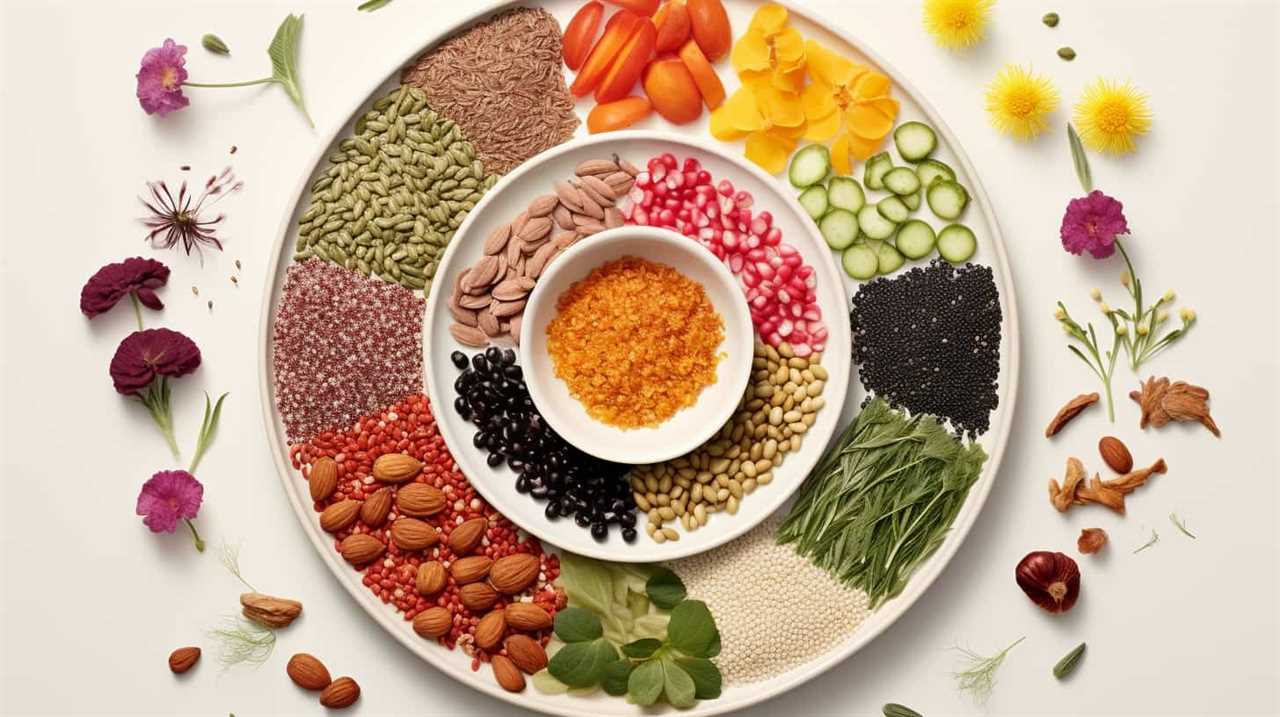
Now, let’s explore expert opinions on the safety and efficacy of chia seeds for kidney health.
Expert Opinions on the Safety and Efficacy of Chia Seeds for Kidney Health
After considering the precautions for individuals with kidney problems when consuming chia seeds, it’s important to explore expert opinions on the safety and efficacy of chia seeds for kidney health.
Expert opinions on this matter vary. Some experts believe that chia seeds can be beneficial for kidney health due to their high fiber content, which can help regulate blood sugar levels and promote digestive health. Additionally, chia seeds are rich in omega-3 fatty acids, which have been shown to reduce inflammation and improve heart health, potentially benefiting overall kidney function.
However, other experts caution against consuming large amounts of chia seeds, as they can absorb liquid and expand in the digestive tract, potentially leading to gastrointestinal issues in individuals with kidney problems. As always, it’s best to consult with a healthcare professional before making any dietary changes, especially if you have kidney issues.
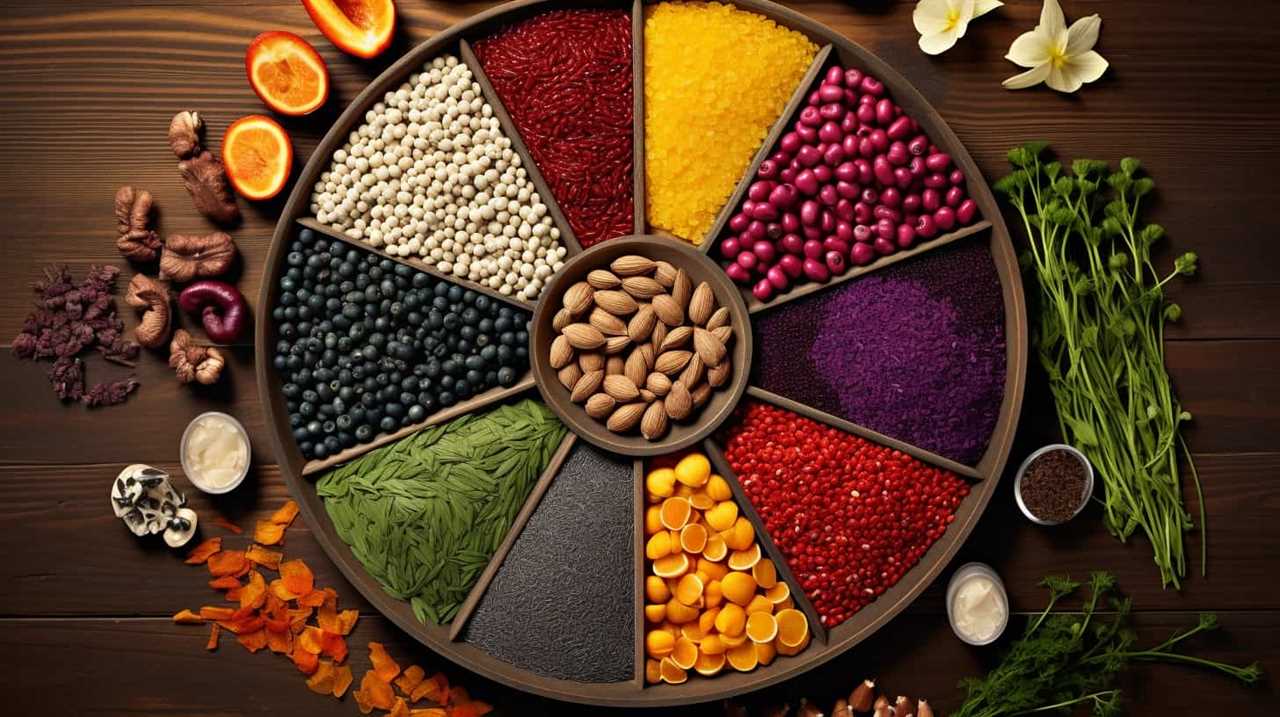
Frequently Asked Questions
Can Chia Seeds Cure Kidney Disease?
Chia seeds can be a beneficial addition to an overall kidney-friendly diet. While they may not cure kidney disease, they are nutrient-dense and can contribute to better overall kidney health when incorporated into a balanced eating plan.
How Much Chia Seeds Should Be Consumed Daily for Kidney Health?
Incorporating chia seeds into our daily diet provides numerous nutritional benefits for overall health. To ensure optimal kidney health, it is recommended to consume an appropriate amount of chia seeds daily.
Are There Any Side Effects of Consuming Chia Seeds for Individuals With Kidney Problems?
Chia seeds can have potential benefits and risks for kidney health. They are a good source of essential nutrients for individuals with kidney problems. It’s important to consult a healthcare professional for personalized advice.
Can Chia Seeds Help Improve Kidney Function in Individuals With Chronic Kidney Disease?
Chia seeds have been touted as a superfood for their potential benefits in kidney health and renal function. However, it is important to consult with a healthcare professional before incorporating them into your diet.
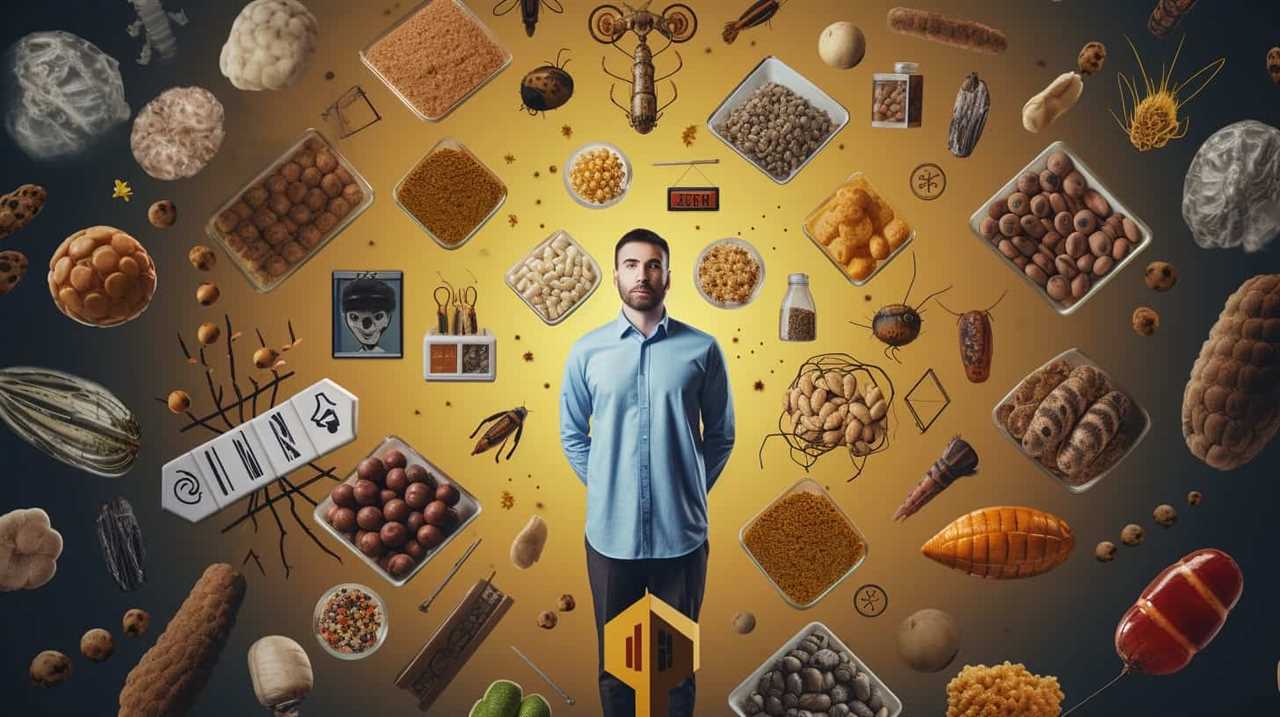
Can Chia Seeds Interact With Medications Commonly Used for Kidney Disease?
Chia seeds may interact with medications commonly used for kidney disease. It is important to consult with a healthcare professional about potential interactions and the appropriate dosage of chia seeds.
Conclusion
In conclusion, chia seeds have shown potential benefits for kidney health due to their nutritional profile and scientific research on kidney function.
However, individuals with kidney problems should exercise caution when consuming chia seeds. It’s always advisable to consult with a healthcare professional before making any dietary changes.
Overall, while chia seeds may offer some advantages, it’s important to consider individual circumstances and seek expert opinions for personalized advice.

Hi, I’m Sarah. I write for Turtle Tree Seeds, a news blog that loves food – all kinds of food. But especially bacon, chocolate, and veggies. We’re on a mission to show the world that you can enjoy all of those things, even kale and brussels sprouts. Because we believe that when it comes to food, there’s no such thing as guilty pleasures. Just pleasures.
I’m also a huge fan of puns (obviously).
-

 Chia Seeds3 months ago
Chia Seeds3 months agoCan Cats Have Chia Seeds?
-

 Chia Seeds3 months ago
Chia Seeds3 months agoHow Do Chia Seeds Go Bad?
-

 Chia Seeds3 months ago
Chia Seeds3 months agoDo Chia Seeds Make You Poop?
-

 Health Risks and Allergies Related to Chia Seeds3 months ago
Health Risks and Allergies Related to Chia Seeds3 months agoWhy Do Chia Seeds Gel
-

 Chia Seeds3 months ago
Chia Seeds3 months agoHow to Use Chia Seeds For Weight Loss
-

 Chia Seeds and Digestive Health2 weeks ago
Chia Seeds and Digestive Health2 weeks agoWhy Are Chia Seeds Beneficial For Gut Health?
-

 Chia Seeds3 months ago
Chia Seeds3 months agoHealth Benefits of Chia Seeds For Dogs
-

 Chia Seeds in Gluten-Free Diets2 months ago
Chia Seeds in Gluten-Free Diets2 months agoYour Dependable Guide: Chia as a Gluten Substitute





